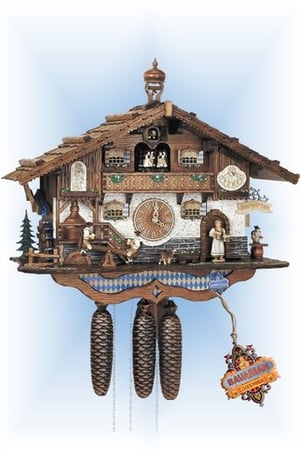
Bob Ellis had been in the entrepreneurship game for a long time—25 years, to be precise.
From insurance to real estate to hospitality businesses, Ellis has started and run them all. But as diverse as his entrepreneurial resume is, all his prior ventures have one thing in common: they were brick and mortar operations that depended on the local market to be successful, and, in turn, were limited in their growth opportunities.
“I reached a stage in my career where I was looking for a new challenge,” Ellis says. “I wanted to start a company that could scale and didn't have a ton of overhead.”
E-commerce seemed like the perfect fit.
A Cuckoo Idea

Many million-dollar businesses start out as a hobby, and it was no different for Ellis in his newest business pursuit. His hobby, however, was pretty far off the beaten path: cuckoo clocks.
“I have always had a passion for craftsmanship and antiques. I had even visited Germany in the past and bought a cuckoo clock for my home,” he says.
He decided to invest in his interest at the next level and test the e-commerce waters selling Black Forest cuckoo clocks.
The Black Forest covers a large mountain range in southwest Germany, and it’s known as the birthplace of the modern cuckoo clock as we know it. Ellis’ company, Bavarian Clockworks, sells authentic German cuckoo clocks imported from this region.
As you might guess, at first there weren’t exactly customers beating down Ellis’ door to buy the product. He knew how to attract customers to a brick and mortar location, but luring in shoppers onlinewas uncharted territory.
“My previous brick and mortar stores relied on their physical location and word of mouth to attract customers. With e-commerce, it's an entirely different game,” Ellis says.
First, he needed a website that was both engaging and easy to find. Next, he needed an understanding of the types of people who were looking for his product and the questions they had during different phases of their product research.
Needless to say, Ellis picked up a whole lot of digital marketing know-how along the way.
“It's a skill I had to learn out of necessity.”
Making The Margins Work
It’s a metric every entrepreneur knows well: margins.
Not only do your margins define the percentage of money that stays in your pocket after every sale, but they’re a major indicator to the financial health of your business.
You should always know your margins, but we talk with many entrepreneurs who use our outsourced accounting services who don’t have a handle on exactly what their margins are at first.
Margins are not a dollar figure, but a percentage. To calculate your gross margin, first start by finding your gross profit. Your gross profit can be found by taking your total sales and subtracting the cost of goods sold. This is how much money you keep after every sale is made.
Next, take your gross profit and divide it by your total sales. The resulting number is expressed as a percentage and is known as your gross margin. (Margins are a lot easier to understand when you see an example on paper! We break it down further in this post.)
Related: How To Calculate Gross Margin
 Back to Ellis and his German cuckoo clocks; at first, his margins were razor thin. His German suppliers required orders of a certain volume to secure the best pricing, but the demand for that much product simply didn’t exist yet.
Back to Ellis and his German cuckoo clocks; at first, his margins were razor thin. His German suppliers required orders of a certain volume to secure the best pricing, but the demand for that much product simply didn’t exist yet.
“We were still a young company without an audience,” Ellis says. “It didn’t make sense to make such large orders at the time.”
Thus, he had to eat into his own profits to keep prices reasonable while he worked on building traffic.
Over the next three years, Ellis put his customers’ shopping habits under a magnifying glass to understand exactly who was buying what and when. He noted things like the time and dates of purchases, how many visits a shopper made to his site before becoming a customer, and which products seemed to attract the most attention.
Slowly but surely, he improved his margins by more than 40%.
“We now have a better understanding of which products are in high demand and what time of the year we are likely to experience a peak in sales,” Ellis says. “As a result, we know the right amount of each product to order from our suppliers, which means less cash tied up in inventory management.”
Simultaneously, as he established the company name in the marketplace and gained market share, he was able to negotiate better volume pricing and terms with his suppliers.
“Now we can offer our customers a great value while also ensuring our company is profitable.”
Doing Business An Ocean Away
Optimizing his margins wasn’t the only challenge Ellis dealt with early on in his business. There was another big hurdle to clear: dealing with overseas suppliers.
If he wanted to remain true to his mission to sell authentic Black Forest cuckoo clocks, he had to get them directly from the source—thousands of miles away and in a country with a completely different currency.
“Not anyone can open up a store and begin selling authentic German cuckoo clocks,” Ellis says. “The barriers to entry are larger when you need to develop overseas relationships.”
However, he says he saw the upsides of the challenge, too; since it was a difficult market to enter, it meant less competition.
Ellis began building those key supplier relationships with a mind toward education. He worked to learn local language and make himself aware of the specific regulatory requirements and business customs.
“Some cultures are more formal than others, and laws can vary greatly between countries. I find it helpful to visit another country and develop contacts with expats to learn more about the local customs and business environment.”
Today, three years after starting Bavarian Clockworks, the company nets more than $1 million in annual revenue. It’s become a successful venture by all measures, but Ellis says it’s about more than just dollars on the balance sheet.
“To give real service you must add something which cannot be bought or measured with money, and that is sincerity and integrity.”
Get weekly stories from real-world entrepreneurs about running a better business and making more money. Subscribe below!
You Might Also Like...
Client Spotlight: This Entrepreneur Built A Business Turning Music Education On Its Head














.png)


